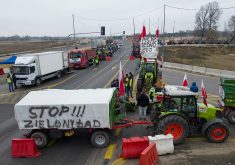Farmers’ protests across the European Union aim to press leaders for more help with taxes, rising costs, cheap imports and bureaucracy.
In most countries, farmers say they are not paid enough, are choked by taxes, red tape and excessive environmental rules and are harmed by cheap food imports.
Large amounts of imports from Ukraine, for which the EU has waived quotas and duties since Russia’s invasion, and renewed negotiations to conclude a trade deal between the EU and South American bloc Mercosur have fanned discontent about unfair competition in sugar, grain and meat.
Read Also

The Organization for Economic Co-operation and Development lauds Canada’s low farm subsidies, criticizes supply management
The Organization for Economic Co-operation and Development lauded Canada’s low farm subsidies, criticized supply management in its global survey of farm support programs.
The farmers say imports put pressure on European prices while not meeting environmental standards imposed on EU farmers.
The European Commission recently proposed to limit agricultural imports from Ukraine by introducing an “emergency brake” for the most sensitive products — poultry, eggs and sugar — but producers say the volume would still be too high.
Farmers also take issue with new EU subsidy rules, such as a requirement to leave four percent of farmland fallow.
They denounce excessive bureaucracy, which French farmers say their government compounds by over-complicating implementation.
In late January, the Commission responded by exempting EU farmers for 2024 from the requirement to keep some of their land fallow. They would still receive EU farm support payments, but would need to instead grow crops without using pesticides.
In Germany and France, the EU’s biggest agricultural producers, farmers have railed against plans to end subsidies or tax breaks on agricultural diesel. Greek farmers want a reduced tax on diesel.
Paris and Berlin have both relented to pressure and rowed back on their plans.
Here is a breakdown of factors prompting protests country by country:
France
– Onerous EU red tape
– Diesel prices
– Government drive to reduce food inflation left many producers unable to cover high costs for energy, fertilizer and transport
– Access to irrigation
– Criticism over animal welfare and use of pesticides
Belgium
– EU requirement to leave four percent of land fallow
– Cheap imports
– Subsidies favour larger farms
Poland
– Cheap imports from Ukraine
– EU regulation
Spain
“Suffocating bureaucracy” in Brussels erodes crop profitability
– Trade deals open doors to cheap imports
Portugal
– Insufficient state aid, subsidy cuts
– Heavy red tape
Romania
– High cost of diesel
– Expensive insurance rates
– EU environmental regulations
– Cheap imports from Ukraine
Greece
– Slow compensation for crop damage and livestock lost in 2023 floods
– Diesel tax and surging electricity bills
– Falling state and EU subsidies















